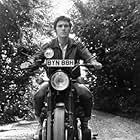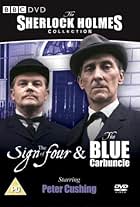Sherlock Holmes and Dr Watson solve the mysteries of copper beeches, a Greek interpreter, the Norwood builder, a resident patient, the red-headed league, and one final problem.Sherlock Holmes and Dr Watson solve the mysteries of copper beeches, a Greek interpreter, the Norwood builder, a resident patient, the red-headed league, and one final problem.Sherlock Holmes and Dr Watson solve the mysteries of copper beeches, a Greek interpreter, the Norwood builder, a resident patient, the red-headed league, and one final problem.
Browse episodes
Storyline
Did you know
- TriviaClosing credits show some of Sidney Paget's illustrations for the stories originally published in the Strand Magazine.
- ConnectionsEdited into Biography: Sherlock Holmes: The Great Detective (1995)
Featured review
If you are going to buy one Conan Doyle DVD let this be it. If you're going to watch a single episode, let it be The Crooked Man.
For this is as good as it gets. We have a glorious incarnation of Holmes and Watson here. Brett's Holmes - cantankerous, affected, whimsical, rude, arrogant, precipitous, charming - can only have been drawn from the deepest possible understanding of the text. There have been similar efforts along the same lines, though none so successful. No other Holmes has come close to Brett's portrayal of the brilliant but obsessed mind, teetering on the knife edge dividing madness and genius.
Brett's portrayal of Holmes is enough to lift this series above any other. But Granada (who are damn good at this sort of thing when they try) have nailed the two other vital essences of the stories and this makes their achievement unique.
Firstly we have a totally new take on Watson, a brisk, wonderfully intelligent man of action, a fearless fellow crime fighter and stalwart support. As David Burke leads Holmes round the Aldershot camp in The Crooked Man, you understand exactly what Holmes found appealing in the bluff ex-soldier, who chronicles his victories, appreciates and learns his methods and soothes his clients when Holme's interrogation causes offence. This is new and unsurpassed. I prefer Burke's to Hardwicke's more thoughtful Watson. Both are top drawer character actors with fantastic credits, but for me, Burke has an impulsiveness and breezy candour that gives his Watson extra light and colour. Hardwicke, in the later series, does a lot more to suggest the difficulty of living with a man like Holmes.
An even more significant achievement is the recreation of the deft energy, economy and speed with which Conan Doyle transports his audiences into the heart of Victorian London. Only Dickens did it with anything like the same authority and style. Lovers of the fantastic Sydney Paget illustrations will recognise his work everywhere in the props and scenery. Many of the more famous illustrations are lovingly recreated, but this is really about the chemistry of detail and pace. Granada have the formula just right. So perfect in fact, that when they try to extend it to feature length, it fails, just as Conan Doyle failed in his own attempts to extend the format to novel-length stories. The longer pieces are again, the weakest of the set.
If this disk doesn't fill you with delight, go back to the text, read again and look again, or you risk undervaluing one of the greatest achievements of TV drama.
Sir Arthur, I'm sure, would have been both delighted and impressed.
For this is as good as it gets. We have a glorious incarnation of Holmes and Watson here. Brett's Holmes - cantankerous, affected, whimsical, rude, arrogant, precipitous, charming - can only have been drawn from the deepest possible understanding of the text. There have been similar efforts along the same lines, though none so successful. No other Holmes has come close to Brett's portrayal of the brilliant but obsessed mind, teetering on the knife edge dividing madness and genius.
Brett's portrayal of Holmes is enough to lift this series above any other. But Granada (who are damn good at this sort of thing when they try) have nailed the two other vital essences of the stories and this makes their achievement unique.
Firstly we have a totally new take on Watson, a brisk, wonderfully intelligent man of action, a fearless fellow crime fighter and stalwart support. As David Burke leads Holmes round the Aldershot camp in The Crooked Man, you understand exactly what Holmes found appealing in the bluff ex-soldier, who chronicles his victories, appreciates and learns his methods and soothes his clients when Holme's interrogation causes offence. This is new and unsurpassed. I prefer Burke's to Hardwicke's more thoughtful Watson. Both are top drawer character actors with fantastic credits, but for me, Burke has an impulsiveness and breezy candour that gives his Watson extra light and colour. Hardwicke, in the later series, does a lot more to suggest the difficulty of living with a man like Holmes.
An even more significant achievement is the recreation of the deft energy, economy and speed with which Conan Doyle transports his audiences into the heart of Victorian London. Only Dickens did it with anything like the same authority and style. Lovers of the fantastic Sydney Paget illustrations will recognise his work everywhere in the props and scenery. Many of the more famous illustrations are lovingly recreated, but this is really about the chemistry of detail and pace. Granada have the formula just right. So perfect in fact, that when they try to extend it to feature length, it fails, just as Conan Doyle failed in his own attempts to extend the format to novel-length stories. The longer pieces are again, the weakest of the set.
If this disk doesn't fill you with delight, go back to the text, read again and look again, or you risk undervaluing one of the greatest achievements of TV drama.
Sir Arthur, I'm sure, would have been both delighted and impressed.
Details
Contribute to this page
Suggest an edit or add missing content

Top Gap
By what name was The Adventures of Sherlock Holmes (1984) officially released in Brazil?
Answer





































